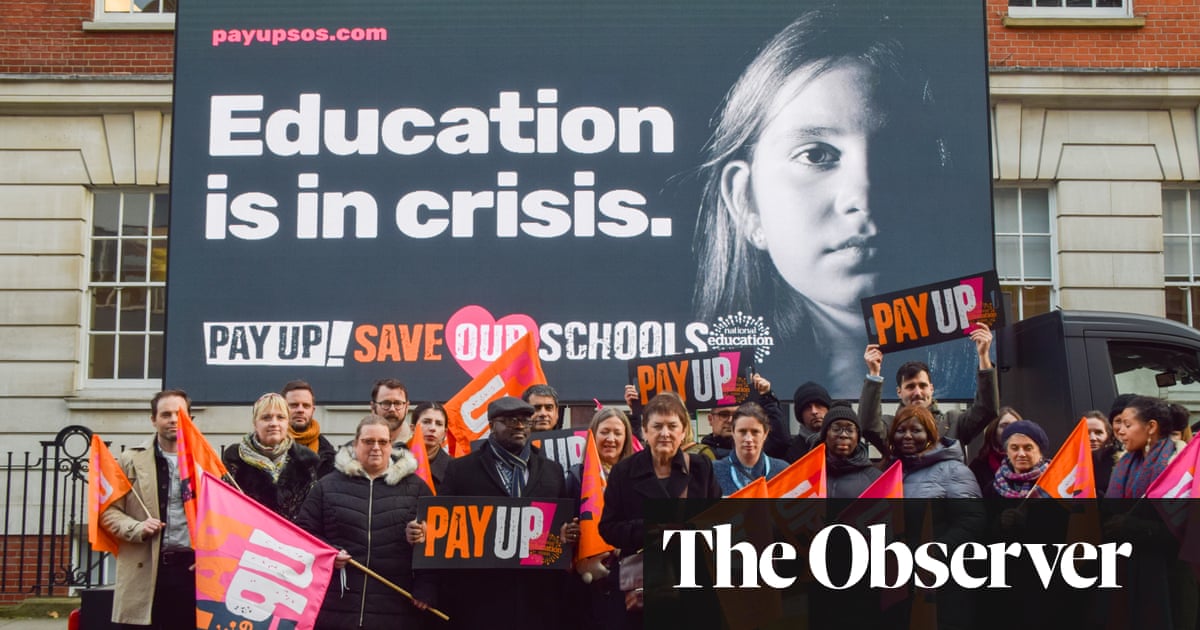
Parents are being called on to help teachers in their fight for a pay rise as unions try to win the public relations battle against the government over next month’s strikes.
With thousands of schools across England and Wales set to close in February after teachers voted to strike, the Association of School and College Leaders (ASCL) union has told the Observer that it is working with Parentkind, the umbrella group for parent-teacher associations in schools, and with school governors to get parents to lobby backbench Conservative MPs on the crisis in recruiting and retaining teachers.
The education secretary, Gillian Keegan, said parents would be “deeply disappointed” that members of the National Education Union were risking the “education and wellbeing” of children with the strikes, which could close individual schools for up to four days.
But Geoff Barton, general secretary of the ASCL, said: “We are determined that after underfunding education for 12 years, the government won’t be allowed to get away with trying to blame the teachers.”
He said while ministers are trying to enforce minimum service requirements for teachers and public service workers through the government’s anti-strike bill, his union would urge parents to write to Conservative MPs, asking them: “Shouldn’t there be a minimum requirement that my child is taught by a qualified teacher [in that subject]?”
He added: “A lot of these MPs are in very fragile seats and know an election is coming, so parents have power to demand change.”
Education unions say teacher shortages are now a critical problem for almost every school, with pay too low to attract and retain enough staff. School leaders say job adverts for teaching science, maths, computing and modern languages often receive no applications at all.
Many teachers mocked Rishi Sunak’s new year plan for all pupils in England to study maths up to the age of 18, because a large number of schools are struggling to recruit maths teachers. At almost half (45%) of state schools some maths lessons are being taught by teachers qualified in a different subject, according to a recent report by the National Foundation for Educational Research. The Institute of Physics has said that about 400 schools in England do not have a teacher for A-level physics.
Matt Doble, assistant principal and a computer science teacher at Preston secondary school in Yeovil, Somerset, tweeted Keegan last week: “Try and appoint a science teacher and then tell me again how great the pay is.” He said his school had advertised for posts in science four times without a single application or inquiry.
He added: “Graduates are able to earn significantly more out in industry. I have a background in computer science and regularly see job adverts for software engineers earning double my salary in nearby Bristol or working from home.”
David Robertson, a maths teacher at a secondary academy in south-east England, said: “We have had to recruit two teachers who aren’t qualified in maths into our team of eight. Students are losing the love of the subject.” Robertson said the deputy headteacher at his school now spends most evenings trying to find supply teachers. “One group of children have had 60% of their lessons taught by cover staff,” he added.
Chris Hillidge, director of science, technology, engineering and maths at the Challenge Academy Trust, which runs 10 primary and secondary schools in Warrington, Cheshire, said: “In computer science we are recruiting almost no specialists. They aren’t there. The vast majority of schools in the north-west have non-specialists teaching physics.”
He added: “Parents might not be aware that their child is being taught physics by a biologist or a sports scientist, but they are noticing when they have a supply teacher for a period of time because of shortages.”
Paul Whiteman, general secretary of the National Association of Head Teachers union, said it will encourage heads to write to parents about why teachers are striking, or discuss it at the school gates.
He said: “I think it is incumbent on school leaders to explain to parents the impact of more than a decade of underfunding of schools.” He added that problems recruiting and keeping staff were “the central issue” for heads now and inadequate pay was the biggest contributing factor.
John McNally, chief executive of the Share Multi Academy Trust in West Yorkshire, wrote to parents about strike dates last week. He also explained that teachers were protesting because of “concerns about funding of schools, the erosion of educators’ pay and the subsequent difficulties this causes for recruitment, especially in shortage subjects”.
He said: “I think it is important for parents to understand that those teachers who have chosen to strike are doing so because they feel very strongly about the issues.”












